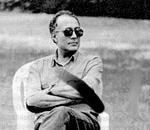ABC Kiarostami
Wednesday, August 17th, 2005prepared by Nika Bohinc
 And so he came, our Abbas Kiarostami. On a lovely thursday in Gorizia, during the Amidei film festival. One of the great authors of our time. A poet, a philosopher, a painter, a photographer, all that and more. Reserved at first, he got completely relaxed when he started to talk about his work and his art. After the press conference he sat among the audience, conversed with his fans and that very evening receieved an Amidei prize for his opus. A lot has been said in these days and we have collected a few of his precious thoughts below. » read more
And so he came, our Abbas Kiarostami. On a lovely thursday in Gorizia, during the Amidei film festival. One of the great authors of our time. A poet, a philosopher, a painter, a photographer, all that and more. Reserved at first, he got completely relaxed when he started to talk about his work and his art. After the press conference he sat among the audience, conversed with his fans and that very evening receieved an Amidei prize for his opus. A lot has been said in these days and we have collected a few of his precious thoughts below. » read more

 African filmmaking is too often equated with film production from Mali, Senegal and Burkina Faso. It is true, of course, that these countries have produced many excellent directors, such as Djibril Diop Mambéty from Dakar, Bamako’s Souleyman Cissé and Idrissa Ouédraogo from Ouagadougou. Yet the cinema of these countries is largely influenced by the traditions of their colonial past. Besides being critical, it also reflects a conformity which is the inevitable result of economic restrictions. Being involved in filmmaking means, first and foremost, complying with the dictates of the market and with production demands.
African filmmaking is too often equated with film production from Mali, Senegal and Burkina Faso. It is true, of course, that these countries have produced many excellent directors, such as Djibril Diop Mambéty from Dakar, Bamako’s Souleyman Cissé and Idrissa Ouédraogo from Ouagadougou. Yet the cinema of these countries is largely influenced by the traditions of their colonial past. Besides being critical, it also reflects a conformity which is the inevitable result of economic restrictions. Being involved in filmmaking means, first and foremost, complying with the dictates of the market and with production demands.

 What, if anything, is common to the films of Eastern Europe, Asia, Africa and Latin America? The first possibility in the search for useful definitions of such films could examine their conditions of production. These are frequently curtailed by economic relations of semi- or underdevelopment that influence the technical, narrative, and genre possibilities of a given film. For instance, East European science fiction or fantasy (think of Tarkovsky’s Stalker and Solaris or the use of classical trick camera in the films of Jan Ĺ vankmayer) cannot compete with the expensive special effects of Star Wars.
What, if anything, is common to the films of Eastern Europe, Asia, Africa and Latin America? The first possibility in the search for useful definitions of such films could examine their conditions of production. These are frequently curtailed by economic relations of semi- or underdevelopment that influence the technical, narrative, and genre possibilities of a given film. For instance, East European science fiction or fantasy (think of Tarkovsky’s Stalker and Solaris or the use of classical trick camera in the films of Jan Ĺ vankmayer) cannot compete with the expensive special effects of Star Wars. 




